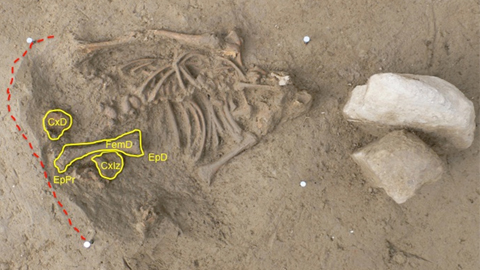Palaeogenetics and archaeology at the 5th Camp de les Lloses Workshop

26/11/2019
Palaeogenetics is an extremely new field of research which emerged less than 30 years ago.It focuses on demonstrating the possibility of extracting genetic information from ancient materials, skeletal remains and fossils, and even obtaining the complete genome of individuals from different time periods and places. However, there are still many questions to solve in this area. What do the studies of palaeogenetics really provide? How far can we go with palaeogenetics?
These types of questions were discussed by experts from Catalonia, Spain, and from all over Europe participating in the 5th Camp de les Lloses Workshop. Apart from others aspects, they spoke about the cultural, social and economic evidences of palaeogenetic studies; molecular bio-archaeology and genetic answers to archaeological problems.
The debates were organised by the UAB Biological Anthropology Research Group (GREAB), the Camp de les Lloses Archaeological Park (Tona) and the cultural association of the ACUCALL site. The debates were offered in two sessions. The first session, presided by Assumpció Malgosa, Chair Professor in Physical Anthropology at the UAB Department of Animal Biology, Plant Biology and Ecology and Director of GREAB, included the participation of Carles Lalueza from the Institute of Evolutionary Biology (IBE-CSIC); Cristina Martínez-Labarga from the Università degli Studi di Roma Tor Vergata; and Hannes Schroeder from the Natural History Museum of Denmark.
The second session was presided by Jordi Principal, curator of classical antiquity collections of the Museum of Archeology of Catalonia (MAC). It included speeches by Rosa Irene Fregel from the University of La Laguna; by Assumpció Malgosa and Cristina Pereira from the UAB Department of Animal Biology, Plant Biology and Ecology; and by Xavier Clop from the UAB Department of Prehistory. The workshop ended with a debate in which all participants were invited to participate.
UAB Research at Camp de les Lloses
The Camp de les Lloses is an archaeological site dating back to the Romanisation of the northeastern region of the Iberian Peninsula (end of the 3rd century and beginning of the 2nd century BCE), in which members of the GREAB have been working since the end of the 1990s to study the perinatal remains found buried under the excavated houses. During the first few years, thanks to the involvement of Alícia Alesán and Santi Safont, researchers were able to conduct morphological analyses of the remains. Since 2015, Assumpció Malgosa, Cristina Santos and Dominika Nociarova have also been working on DNA analyses. The latest palaeogenetic studies published by the researchers point towards a new interpretation of the remains which moves away from the hypothesis of sacrifice suggested until now.